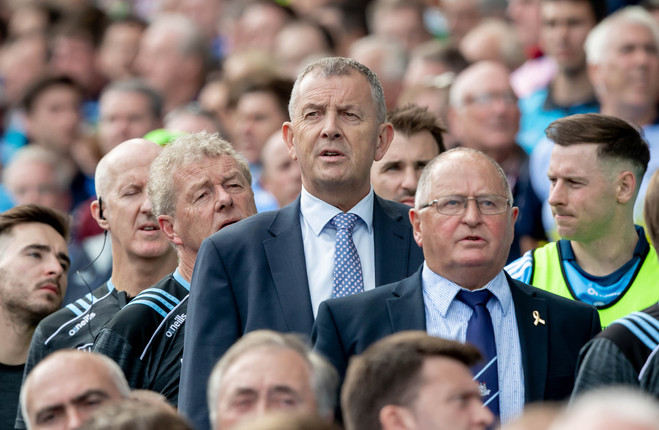DUBLIN GAA CEO John Costello says a “worrying shift” in the GAA’s funding distribution will cost the county €450,000 per annum, resulting in job losses and the sale of assets.
Last year, Dublin received €745,000 in games development funding, €550,000 more than the second county on that list, Antrim.
The GAA’s new funding distribution model for coaching puts a greater emphasis on adult player numbers. GAA director general Tom Ryan said the change would result in decreased funding for “at least one county”, with “the overwhelming majority” seeing a “significant increase”.
Writing in his annual report, Costello called it a “surreptitious shift in association policy” which will cause the dismantling of Dublin’s integrated coaching system. He said funding should instead be targeted according to juvenile player numbers.
“I am surprised and disappointed, to be honest, that the new GAA model for funding for coaching and games development is based on registered male players from the age of four to 37 years of age. This is a worrying shift in association policy that funding is now being targeted at the older age groups. At a recent meeting attended by the GAA Director of Coaching and Games Development and the Árd Stiúrthóir, we were informed that the Games Promotion Officers should be working at this age cohort,” wrote Costello.
“Without wishing to sound glib, does anyone think that investing in coaching for any 30-something is the best way of spending finances? Will our Games Promotion Officers be expected to arrange a Go Games programme for Over-35s? Are we to develop Tag Camán and Tag Peil programmes? Do we really need to even include 23-year-olds when we are allocating scarce funding resources?
“Perhaps more importantly, in this four-year funding model, the absence of any grant for coaching females is alarming when one of the current chief aims of the association, under the leadership of former president Mary McAleese, is to integrate GAA, LGFA, and Camogie at all levels. I fear that this model, in trying to please or maybe appease, has overextended itself and lost sight of the original intention of this vital funding stream.
“The new funding model – and the surreptitious shift in association policy – will result in an annual reduction of €447,978 in coaching funding to Dublin. The consequences of this rationalisation will result in the dismantling of the integrated coaching scheme in Dublin, with resulting job losses and redundancies and the sale of assets
“And there are real challenges for Gaelic games in Dublin. We have had to meet the challenge of a growing professional international sport in rugby, the ongoing battle with young people who are attracted by the big names and money of soccer, and a plethora of other sports and distractions that are likely to be unique to big cities. It is a constant battle for the hearts and minds of our young people.
“The coaching network we have established through our clubs is immense and absolutely critical in matching and, hopefully, winning the battle with our competitors. We have always sought to channel investment into our grassroots as we believe this maximises the effect of the investment and optimises the value for money. It also brings about the best and most favourable long-term impact for the association overall.”
In a section titled ‘Time For RTÉ To Up Its Game’, Costello called for the national broadcaster’s additional highlights rights to be given to a Saturday Game show.
“Hopefully, this will safeguard against the recent tendency to pay lip service to matches involving lower-tier counties, with minimal highlights shoehorned into a couple of minutes. For far too many years, when it came to live TV sport, Gaelic Games were like the Invisible Man on RTÉ once the All-Ireland finals were wrapped up and we waited impatiently for the following year’s championship to roll around.”
He added: “Isn’t it high time that RTÉ not alone satisfied our craving for live action and more highlights, but also gave us a Friday night magazine programme, full of insightful previews, player interviews, debate, and colour? Is that too much to ask of our increasingly dominant main player?”
Costello also called on the GAA to return the minor grade to U18 and allow senior panellists to play in the All-Ireland U20 championships.
“Experimentation is always worthwhile in any walk of life but sometimes you have to put your hand up and admit that it didn’t work – and so it is, in my opinion, with the U17 and U19 grades at club level.
“I welcome the recent decision of the Task Force to decouple these grades from their inter-county equivalent and give counties the autonomy to return to an U18 competition at club level if they wish to do so, arguably this should also be examined at inter-county level also.
“There is too much of an overlap with players at U19 club level and adult grade and what we have experienced in Dublin is that there are too many scheduled fixtures that go unfulfilled. It is also particularly difficult for clubs with smaller playing numbers.
“What players want is meaningful competitions and, unfortunately, this has not proven to be the case – so it’s time to call a halt.”
